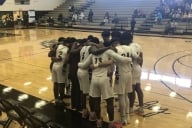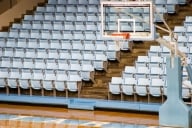You have /5 articles left.
Sign up for a free account or log in.
For years, Harvard University's men's soccer team created an annual "scouting report" in which they evaluated, in sexually explicit terms, the freshman members of the women's soccer team. When Harvard officials learned that the tradition had continued up until this year, they canceled the rest of the men's season. Now, Harvard officials are investigating reports that the men's cross-country team created a spreadsheet about members of the female cross-country team using similar language.
That the comments seem to be a tradition among the same male athletes that the women have practiced alongside, traveled with, cheered on and supported over the years made the revelation particularly upsetting. Those who study the role gender plays in college sports say the documents at Harvard point to a larger culture where the actions of male athletes behind closed doors don't always match up with how they behave toward female athletes in public, and where women's athletics are frequently treated as an afterthought.
“We feel hopeless because men who are supposed to be our brothers degrade us like this,” the women’s soccer team wrote in a statement last month. “Having considered members of this team our close friends for the past four years, we are beyond hurt to realize these individuals could encourage, silently observe or participate in this kind of behavior, and for more than four years have neglected to apologize.”
That familial notion of male and female athletes being brothers and sisters is common on college campuses. This is especially true for athletes playing nonrevenue sports -- such as cross-country, soccer and track -- who frequently travel together and share practice facilities. “One of the best things about the rise of women’s sports is the friendship and camaraderie it engenders between boys and girls,” Ruth Conniff, a former college runner and editor in chief of the Progressive, wrote in a chapter of the anthology Sport in Contemporary Society.
In a letter published Monday by The Harvard Crimson, Megan Kate Nelson, a 1994 graduate of Harvard and a former member of the women’s cross-country team, recalled that sense of camaraderie, writing that “the women’s and men’s cross-country teams trained together and traveled together to meets; we cheered the men on as they ran their races.” Then, in the fall of 1993, according to Nelson, members of the men’s cross-country team arrived at a practice wearing T-shirts that featured a list of the women’s initials, ranked by “how many wanted a blow job” from each athlete.
“The idea of male and female athletes being family isn't always evident in how athletic departments and athletes treat women,” said Kristine Newhall, a lecturer at Bridgewater State University who studies gender and college sports. “They should get better practice times. They should get better facilities. Who does this brother-sister relationship benefit, and why do we keep invoking it if it’s rarely benefiting women?”
When James Madison University, citing the gender equity law Title IX of the Education Amendments of 1972, eliminated seven men’s sports in 2006, female athletes were among the most outspoken critics of the decision. Members of the women’s cross-country team even went as far as denouncing Title IX. Newhall said she can’t recall a similar instance of male athletes protesting so vehemently on the behalf of female athletes.
Instead, Harvard’s men’s soccer team adopted a sexist tradition of rating and discussing, in explicit detail, the physical attributes of their female counterparts. Harvard’s men’s cross-country team created a spreadsheet commenting on women’s team members in similar sexually explicit terms. Earlier this year, two Texas A&M football coaches were suspended after they organized a “women’s football clinic” that included a sexist version of the university’s fight song and faux instructions, filled with sexual innuendo, on how female fans should play football. In 2013, Tufts University suspended 27 male lacrosse players for shouting sexist comments at players during a women's volley ball game.
"I think this speaks to the broader question of male privilege, particularly as it links to notions of masculinity and superiority," said Mary Jo Kane, director of the University of Minnesota’s Tucker Center for Research on Girls and Women in Sport. "How better to contain that progress -- that entry into upsetting and undermining male certainties of privilege, until recently always and reassuringly anchored in sports -- than to sexualize female athletes?"
The sexist actions of some male athletes, and the culture surrounding those behaviors, aren't limited to just misogynistic comments.
A female former track and field athlete at the University of Nebraska at Lincoln sued the university in April, saying she was abused by a Nebraska athlete and that when she reported the domestic violence, she was harassed and discriminated against by the athletic department. A former Kent State University softball player is suing officials there after she said she was raped by a baseball player and the athletic department colluded with the accused student’s mother, who was also the woman's softball coach, to cover up the case. A number of victims at the center of the sexual assault scandal involving Baylor University football players were female athletes.
“Harvard is just another example of objectification of women by men, specifically male athletes who ironically should respect and support their female counterparts,” Nicole LaVoi, associate director of the of the Tucker Center, said. “The Harvard men's soccer team is part of a system of sport in which male privilege, and perhaps rape culture and men's athletics' role in creating and sustaining it, is brought to light. What is shocking is that these young men are assumed to be the smartest, best, well-behaved men in our most esteemed colleges. If they have acted like this, then what are all the other men doing?”
Part of the problem, the researchers said, is that while colleges and athletes discuss men’s and women’s sports as though they are part of one family, women are often not treated equally by college athletic departments.
While Title IX has helped give female athletes more opportunities, with the number of female college athletes soaring 500 percent since 1972, college sports have still not achieved equity. According to the National Collegiate Athletic Association, women receive 44 percent of athletic participation opportunities. Female athletes at Football Bowl Subdivision institutions, on average, receive about 28 percent of the total money spent on athletics and 42 percent of athletic scholarship funds. Female athletes receive 31 percent of an average FBS institution’s recruiting dollars.
At the same time, women account for more than half the students at NCAA institutions.
In the last four decades, the percentage of women’s teams being coached by women has fallen from 90 percent to 40. Sixty percent of women's teams are now coached by men. About 3 percent of men's teams are coached by women. The decline in women's share of coaching jobs has slowed in recent years, though not reversed. From 1996 to 2013, according to the NCAA, the number of women coaching women's teams dropped from 43 percent to 40. In the same time period, the proportion of female assistant coaches in Division I women’s basketball fell from 79 percent to 65. About 7 percent of athletic directors are women.
Newhall said the lack of respect for female athletes and coaches extends beyond team and career opportunities, pointing at the way female athletes, such as renowned swimmer and nine-time world champion Katie Ledecky, were treated during this summer’s Olympic games.
“You see it with how much media coverage men’s sports get,” Newhall said. “We saw it all summer with Katie Ledecky. She was called the ‘female Michael Phelps.’ You can be this good, but you’re still going to get compared to men, and that comparison is itself a sign of inferiority. There seems be an underlying assumption of inferiority, and that’s what was revealed in this incident at Harvard.”








